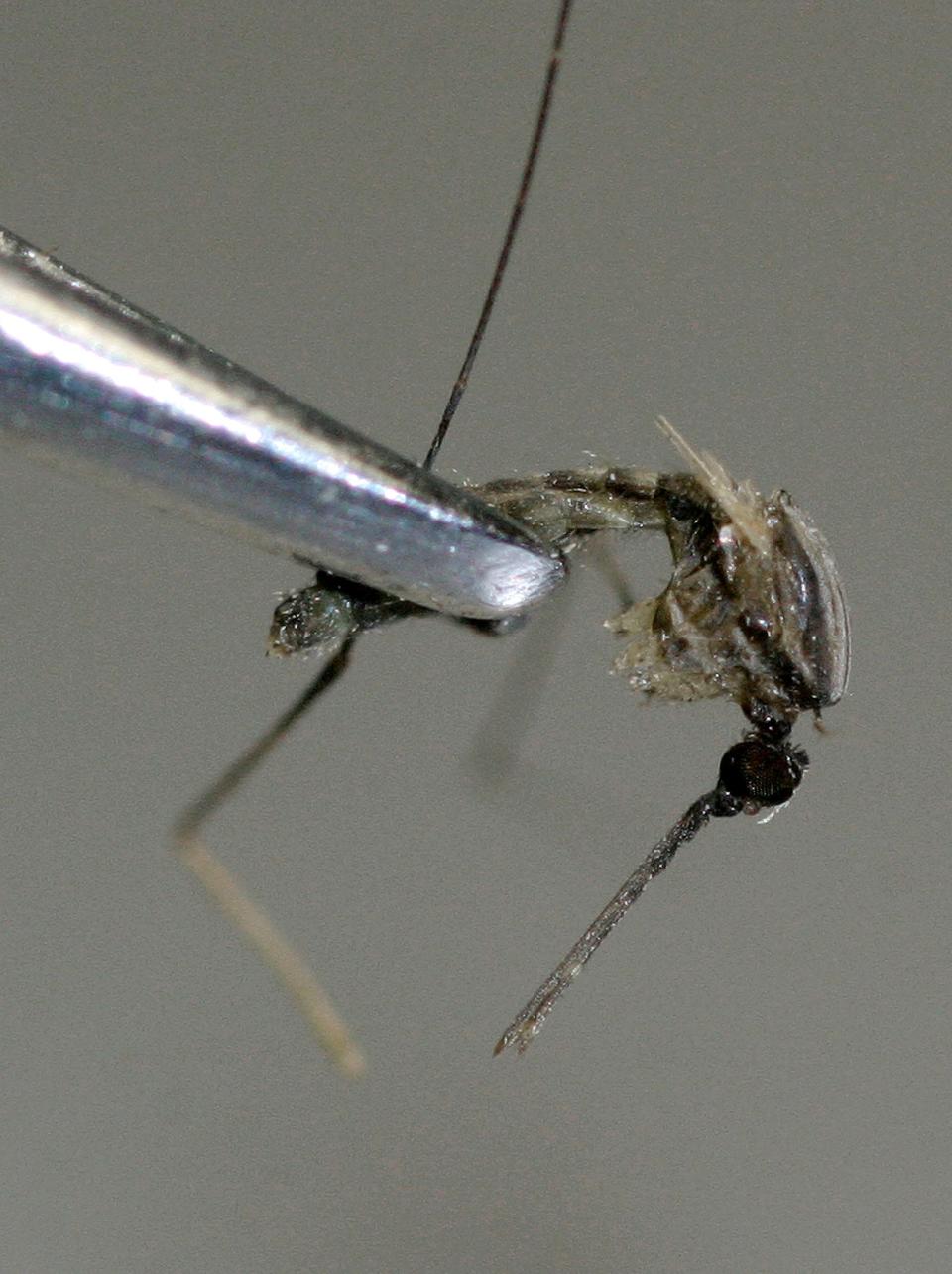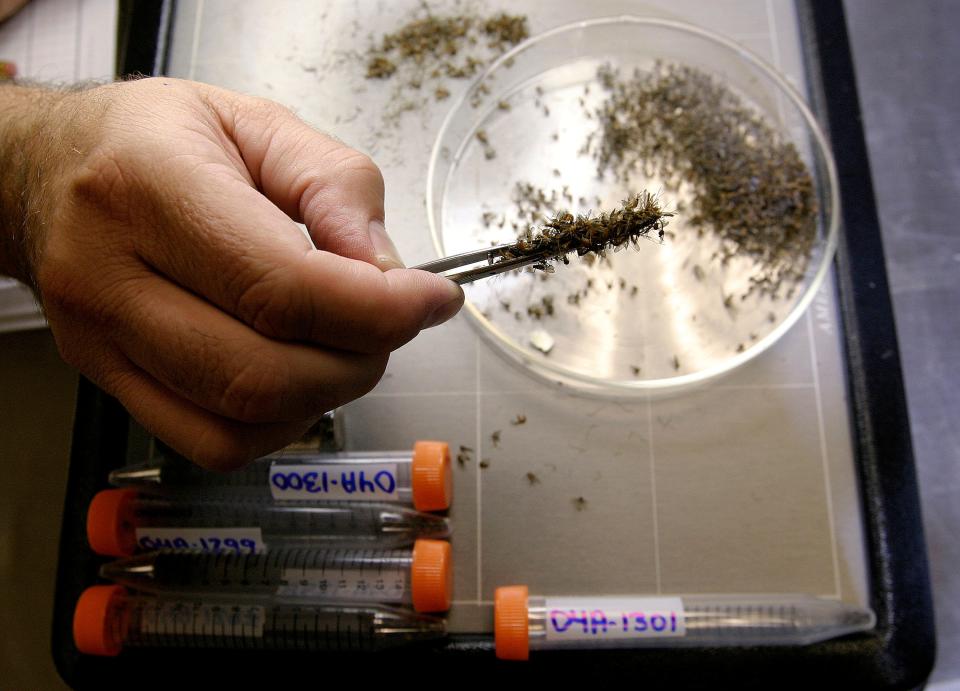West Nile virus-positive mosquitos detected in Des Moines. Here's how to protect yourself.
Des Moines conducted a city-wide mosquito control treatment Thursday night after detecting West Nile virus-positive mosquitos.
The treatment by Clarke, a mosquito control company contracted by the city, includes the use of truck-mounted Ultra-Low-Volume spray machines to reduce the local adult mosquito population. City spokesperson Al Setka said the spray poses no danger to the environment or humans.
"We worked quickly to put together a plan to address the mosquito population effectively and safely throughout the city," Deputy Director of Neighborhood Services SuAnn Donovan said.
Spraying started Thursday night and is expected to be completed by Sunday.
Cases of West Nile virus in Iowa last spiked in 2018, when 104 Iowans contracted the virus, severely sickening 73 and killing three. Since then, case numbers have been in the single digits, according to the CDC. The CDC has reported one presumed case of the virus in Iowa this year.

The detection of West Nile virus around this time of year is "pretty normal," according to Dr. Ryan Smith, an associate professor in the Department of Entomology at Iowa State University who oversees the university's mosquito surveillance program.
"West Nile virus is endemic, meaning that year in and year out, we will always see some kind of West Nile virus transmission," he said.
Based on data collected from seven counties around Iowa, Smith said he does not predict a large outbreak of cases this year.
However, while risk of contracting the virus may be relatively low, Smith urged individuals to stay diligent about taking the appropriate measures to protect themselves.
"This is going to be the highest risk time point of the year as we get into the next couple of weeks," he said.
Not all mosquitos transmit the virus
West Nile virus is transmitted by mosquitos who become infected with the virus after feeding on infected birds, according to the CDC.
Smith previously told the Register about 95% of mosquitos observed by the lab earlier this year were aedes vexans, a species of mosquitos that does not carry diseases.
More: Break out the bug spray. Mosquito forecast warns of increased population in central Iowa.
Smith said the Culex species, whose population is largest in the late summer and early fall, is most likely to carry West Nile virus and spread it to humans.

About one in five people infected with West Nile virus develop symptoms including headache, body aches, joint pains, vomiting, diarrhea, or rash, according to the CDC. However, nearly 80% of those infected with the virus do not develop any symptoms.
In rare cases, West Nile virus can cause inflammation of the brain and spinal cord, leading to severe symptoms such as paralysis, tremors, disorientation, and in even rarer cases, death, according to the CDC.
Protecting yourself from West Nile virus
While there is no vaccine to protect against West Nile virus, officials say there are many actions individuals can take to protect themselves from contracting the virus.
According to Nola Aigner Davis, a spokesperson for the Polk County Health Department, "the best way to prevent West Nile virus is to protect yourself and your family from mosquito bites."
More: Des Moines' mosquito population could spike soon. How can you protect yourself from bug bites?
Davis recommends individuals wear insect repellant and wear long-sleeved shirts and pants when going outside. She also suggests individuals empty and scrub any items which hold water once a week and remove any standing water from their home to prevent mosquitos from laying eggs.
The Iowa Department of Public Health further recommends individuals take the following steps to protect themselves from mosquito bites:
Use insect repellent with DEET, Picaridin, oil of lemon eucalyptus, or IR3535. Always read the repellent label and consult with a health care provider if you have questions when using these types of products for children. For example, oil of lemon eucalyptus should not be used on children younger than 3 and DEET should not be used on babies younger than 2 months.
Avoid outdoor activities at dusk and dawn when mosquitoes are most active.
Wear long-sleeved shirts, pants, shoes and socks outdoors.
Eliminate standing water around your property, because that's where mosquitoes lay eggs. Empty water from buckets, cans, pool covers and pet water dishes. Change water in bird baths every three to four days.
Des Moines residents can call the Mosquito Hotline using the Clarke customer portal or at 800-942-2555 to report standing water issues, request neighborhood spraying or be added to the spray "shut-off" list. For more information, go to dsm.city/departments/neighborhood_services/mosquito_control.php
Francesca Block is a breaking news reporter at the Des Moines Register. Reach her at FBlock@registermedia.com or on Twitter at @francescablock3.
This article originally appeared on Des Moines Register: West Nile virus-positive mosquitoes prompt city-wide treatment

